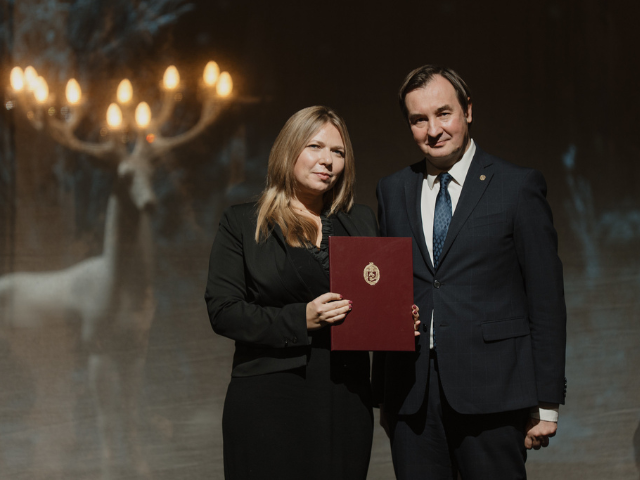As the year draws to a close, Vilnius University traditionally honors and remembers the most deserving members of its community. This year, seven members of the Vilnius University Life Sciences Center (VU LSC) were awarded during the festive event. One of them is Dr. Irena Nedveckytė, a lecturer at the Center for Ecology and Environment Studies, who received the Best LSC Lecturer Award. We asked Dr. Irena Nedveckytė about her decision to become a lecturer, the methods she uses to engage students in the learning process, and what motivates her the most to work at the university.
Did you choose to become a lecturer by chance, or was it an old dream?
I first thought about becoming a lecturer while studying for my PhD. At that time, it seemed like an unreachable dream that would probably never come true. It took quite a bit of time and courage before I decided to test myself in such a responsible position. I must admit – the experience of being a new lecturer was not easy. Many sleepless nights, anxiety, and self-criticism are things that all new lecturers probably go through. However, all of this is compensated by the curiosity, enthusiasm, and sincerity of the students. So, each lecture gradually became less intimidating, and the desire to share the knowledge I have and to inspire students with the amazing world of science only grew. After the first year of teaching, I realized that I couldn’t imagine myself doing anything else.
Can you tell us about the subject you teach and how you engage students?
I teach several subjects related to ecology, plant and animal chemistry, and behavior. In my opinion, all of them are extremely interesting and relevant. I conduct research in these fields and can share the latest discoveries, current problems, and emerging challenges. When you love what you do, others can feel it, too. Students are particularly interested in animal behavior. Just as there are countless species of animals, there are also countless nuances of behavior. We try to discuss these and attempt to understand how each behavior relates to an animal's lifestyle and how it helps them adapt to the constantly changing environment, survive, and reproduce. Students usually get very involved in these lectures and start to understand and see the diversity of these behaviors.
What motivates you the most to teach at the university?
Teaching at the university is incredibly interesting, dynamic, and engaging. It is a constant learning process, not only for the students but also for the lecturer. When teaching at the university, I follow a simple principle – today’s student is tomorrow’s colleague. I am inspired by young people's curiosity, demanding nature, creativity, and ability to look at a task differently. Teaching is especially motivating when you see the transformation from a student to an active member of the university community or a specialist in their field.
 |
